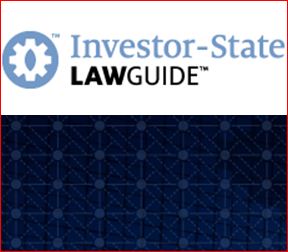Investor-State LawGuide

On this page
Investor-State LawGuide
Database info
Log in by clicking the ‘LOGIN’ button, then click the ‘Auto Login’ button in the top-right corner of the window.
Investor-State LawGuide™ (ISLG) is a collection of tools for researching international investment treaty law. The scope of ISLG’s document collection includes all publicly available ICSID, NAFTA and ad hoc tribunal decisions and awards where the subject of the claim is an investment treaty. These materials are available in a comprehensive document directory. Currently, NAFTA and ICSID awards and decisions are the most complete. The collection also includes investment treaties, including bilateral investment treaties, and rules.
The Research Tools
- Subject Navigator: research complex subjects by isolating relevant issues and digging deeper into the Subject Navigator tree. Within the structure of the Subject Navigator, you will be able to view start by finding higher-level subject areas that are relevant to your research. As you dive deeper into the sub-sections of these subjects, you will be able to focus on the sub-areas that are most relevant to your research.
- Expert Locator: find experts relevant to a specific area of expertise, claimant, dispute status, organisation, person name, respondent State of party which retained them.
- Third Party Funder Locator: find third party funders relevant to a claimant, dispute status, organisation or respondent State.
- Article Citator: see a list of legal instruments (Treaties and Arbitration Rules) to see how these have been interpreted by tribunals. It will allow you to sort these cited instruments by the most commonly cited provisions and allow you to jump directly to the paragraph/footnote in the decision and award document that references the provision.
- Jurisprudence Citator: instantly see how specific decisions have been treated by subsequent investment treaty tribunals.
- Publication Citator: track the history and use of trusted secondary resources. It will allow you to gain insight into how authoritative materials have been utilized and considered by tribunals
- Terms and Phrases tool: see how specific terms or phrases have been defined in the context of previous investment arbitration tribunals
- ISLG Reports tool: see patterns or data synthesized in such a way that will help you gain relevant insights related to cases, people, organisations or disputes.
- Full Text Search tool: run a comprehensive keyword search across all documents in the ISLG collection, including decisions, awards, procedural orders, pleadings, arbitration rules, treaties and other legal instruments.
The Treaties & Rules library consists of the complete repository of Arbitration Rules and Treaty documents that ISLG has analysed and connected to other key entities within the application.
Disputes & Dispute Documents are added to the document collection within 48 hours of their public release. Initially, this means that the dispute documents will be available under the Disputes & Dispute Documents tab and the Full-Text Search tool.
In order to incorporate substantive dispute documents into ISLG’s value-added Research Tools (i.e., the Subject Navigator, Article Citator, Jurisprudence Citator and Terms & Phrases), the document must be subject to expert review by ISLG’s team of editors and contributors. This process takes between 1-2 weeks to complete. Documents that have been subject to this process and have been fully incorporate into the value-added Research tools within the past 30 days will be listed under “Subject Navigator, Article Citator and Jurisprudence Citator”.
ISLG’s weekly newsletter
You can also receive information concerning the latest events and updates to ISLG’s content by signing up for ISLG’s weekly newsletter. To sign up this newsletter, please send email to info@investorstatelawguide.com.

Guides & training
Use the online Knowledge Center for help on making the most of the research tools.
You can also sign up for training webinars to get a comprehensive overview of all the research tools
A number of videos are also available to view via Screencast and YouTube .
Support
